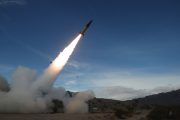
In remarks to CBS on January 14, U.S. National Security Council spokesman John Kirby declared Washington does not wish its operation in the Red Sea to turn into a conflict with Yemen.
Kirby’s remarks came amid media reports about more strikes conducted against Yemeni targets by American and British forces on the same day.
Last week, the United States and the U.K. staged a military operation in the Red Sea following attacks by the Yemen-based Houthi Islamist group on vessels traversing the Red Sea, launching what they called “defensive” strikes against the Houthis in the early hours of Friday morning, and were supported by Australia, Bahrain, Canada, and the Netherlands. U.S. President Joe Biden claiming them to be a success and accusing the Houthis of “endangering freedom of navigation.”
The Houthis have vowed solidarity with Palestinians amid the conflict between Israel and Hamas in Gaza. They have also vowed to assault merchant vessels sailing through the Gulf of Aden until Israel ceases its war with Hamas.
More than 50 countries have been impacted by 27 Houthi attacks on ships as of mid-January, the United States said. American and British forces conducted sorties against dozens of Houthi-linked targets in Yemen over the past few days.
When questioned about the course of the operation, Kirby lauded the West’s military effort, saying, “We think we had good effect.” Kirby added that the air raids were aimed at “degrading” the Houthis’ ability to stage their own strikes.
On January 14, Kirby said Washington was not excluding the possibility of a retaliatory strike by the Houthis and was “watching [the situation] very, very closely.” Some “necessary precautions” have been adopted, he said, without providing details.
Asked whether the U.S. risks another “open-ended conflict” in the region, he responded that Washington wants to avoid this. “Nobody wants a conflict with the Houthis. We’re not looking for a conflict with Yemen here. We’re trying to get these attacks to stop.”
Earlier on Sunday, January 14, Sky News Arabia reported, quoting Houthi media, that a Houthi missile-launch platform and an operations facility in the port city of Hodeida had been targeted in a new air raid that same day. Besides, the Yemeni sources reported massive reconnaissance-drone sightings over the area, slamming U.S. and U.K. forces for bombing the city.
Washington denied carrying out any operations on January 14. “No US or coalition strike occurred today,” a defense official told AFP.
Russia and Turkey condemned the American and British bombing campaigns, with Moscow calling the operations “illegitimate” owing to the lack of UN Security Council permission, and Turkish President Erdoğan lambasting both Western countries for trying to turn the Red Sea into a “sea of blood.”
Russian Foreign Ministry spokeswoman Maria Zakharova stated that recent developments risk derailing the Yemen reconciliation process and igniting a “destabilization of the entire Middle East.”
Based on reports by Reuters, the Western barrage has led to mixed reactions in the EU, where several members would have preferred a less-hostile policy regarding the security crisis in the Middle East.
In a statement to Al Jazeera on January 15, Houthi spokesman Nasruldeen Amer pledged more attacks on American shipping interests in the Red Sea region, saying U.S. and U.K. airstrikes against the Iran-allied group in recent days have made the vessels legitimate targets for destruction.
“The United States is on the verge of losing its maritime security,” Amer stated.
The militant group hitherto claimed that it would only target Israeli ships and vessels bound for Israel. However, Amer said that in wake of U.S.-U.K. airstrikes in Yemen, “it is enough for it to be American.”
Houthi militants had already proven that point earlier on Monday, January 15, attacking a U.S.-owned container ship with a missile in the Gulf of Aden.
The U.S. Central Command (CENTCOM) published a statement saying that the Gibraltar Eagle cargo ship was continuing its journey after the missile attack, which caused no casualties and no major damage.
CENTCOM also stated that a U.S. fighter jet shot down a missile fired from a Houthi-controlled area of Yemen toward the USS Laboon warship, operating in the southern Red Sea, on January 14.
In response to Houthi attacks on vessels in the Red Sea, major transport firms have avoided the Red Sea passage to the Suez Canal, the fastest cargo route from Asia to Europe, disrupting traffic through an area that normally contributes to 15 percent of the world’s commercial shipping volumes.
Subsequently, the United States and UK launched an international bombing campaign called Operation Prosperity Guardian, with the stated goal of making the Red Sea safe for commercial shipping traffic. British and American warplanes staged around 70 strikes on Houthi targets in Yemen on January 11 and January 12. A January 13 article by The New York Times argued that such U.S.-led strikes failed to significantly undermine the militants’ potential, citing its sources, adding that only around 25 percent of the group’s assets had been destroyed.
According to the first assessment of January 12’s barrage cited by the Times, the attacks hit 90 percent of designated targets. However, two U.S. officials indicated that while the strikes had destroyed or damaged more than 60 drone and missile sites, the Houthis still kept about 70-80 percent of their military capability. The article added that some of the militia’s assets are also mobile, meaning they could be concealed if necessary.
Meanwhile, the Times pointed out that identifying Houthi targets was proving more challenging than expected, as Western efforts gained momentum after the start of the Hamas-Israel conflict on October 7.
U.S. officials interviewed by the Times have suggested that Washington may conduct another barrage on Houthi targets after it evaluates the damage from the recent strikes. The outlet’s sources also noted that while the militia’s response to the Western attack has so far been muted, they are awaiting a possible Houthi retaliation.



